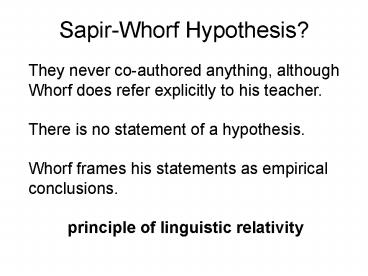SapirWhorf Hypothesis - PowerPoint PPT Presentation
1 / 16
Title:
SapirWhorf Hypothesis
Description:
'I should be the last to pretend that there is anything so definite as a ... Social deixis in Japanese. http://www.abdn.ac.uk/soyuz/at2002 ... – PowerPoint PPT presentation
Number of Views:193
Avg rating:3.0/5.0
Title: SapirWhorf Hypothesis
1
Sapir-Whorf Hypothesis?
They never co-authored anything, although Whorf
does refer explicitly to his teacher. There is
no statement of a hypothesis. Whorf frames his
statements as empirical conclusions. principle
of linguistic relativity
2
Contradiction?
Whorf says that there is no correlation between
language and culture (p. 139), but on pages
148-49 he connects behavioral features to
linguistic categories. Is this a
contradiction?
3
Contradiction - No
P 139 I should be the last to pretend that
there is anything so definite as a correlation
between culture and language, and especially
between ethnological rubrics such as
agriculture, hunting, etc., and linguistic ones
like inflected, synthetic, or isolating.
4
Contradiction - No
P 148-9 people act about situations in ways
which are like the ways they talk about
them. The covert categories of language,
grammar, are associated with unconscious,
cultural assumptions we make about the world,
what is natural, how it works.
5
Language in Culture Japanese
Social deixis in Japanese http//www.abdn.ac.uk/so
yuz/at2002/ Honorifics - the grammar codes
social hierarchies, expressed respect or
condensention by speaker The way you talk to
someone structures the social relationship with
that person
6
Politeness
General expression to everyone flattens
hierarchy German - use of du more and more
common English - you at expense of
thou yall Japanese - more people -san
7
Change
Changes in language are connected to changes in
society and culture, but difficult to identify
cause and effect. The younger generation seems
to be no good as long as there has been written
history
8
Escaping the Prison of Language
- Learn other, radically different languages
- Become conscious of the covert categories and the
unconscious assumptions they imply - Recognize your own assumptions about what is
natural and de-naturalize them.
9
Misinterpreting Whorfs ideas
- Strong version of the hypothesis
- Language determines thought
- Example
- Gordon, P. 2004. Numerical Cognition Without
Words Evidence from Amazonia. Science. 15
October 2004. Vol. 306496-499.
10
Scholarship in the popular press
- http//news.bbc.co.uk/2/hi/americas/3582794.stm
- http//www.guardian.co.uk/life/feature/story/0,,13
31672,00.html - People compared to the intelligence of rodents,
pre-linguistic babies, birds.
11
Does a language without numbers mean people cant
count?
- "At issue here is the strongest version of
Benjamin Lee Whorf's hypothesis that language can
determine the nature and content of thought." - 1) are langs incommensurate Are there terms that
exist in one lang that cannot be trans into
another? - 2)does lack of trans preclude speakers of one
lang from entertaining concepts encoded by the
other language
12
Primitives?
- "a culture without advanced scientific
institutions. - limited exchange with outsiders using "primitive
pidgin systems - "primitive numerical abilities are of two kinds"
- ability to enumerate small quantities accurately
- "Without overt counting, humans and other animals
possess an analog procedure whereby numerical
quantities can be estimated with a limited degree
of accuracy"
13
What is the norm?
- "Words that indicate numerical quantities are
clearly among the basic vocabulary of a language
like English." - Pirahã are a culture with "one-two-many" counting
system - "is it possible for its members to perceive or
conceptualize quantities beyond the limited sets
picked out by the counting sequence, or to make
what we consdier to be quite trivial distinctions
such as that between four versus five objects?"
14
One-two-many system
- hói (one), hoí (two), and many
- one actually small, roughly one, contrasts with
ogii (big) - "suggesting that the distinction between discrete
and continuous quantification is quite fuzzy in
the Pirahã language."
15
Conclusions
- "The results of these studeies show that the
Pirah?'s impoverished counting system limites
their ability to enumerate exact quantitites wen
set sizes exceed two or three items." - "This split between exact enumeration ability for
set sizes smaller than three and analog
estimation for larger set sizes parallels
findings from laboratory experiments with adults
who are prevented from explicity counting
studies of numerical abilities in prelinguistic
infants, monkeys, birds, and rodents and in
recent studies using brain-imaging techniques.
16
Maybe they dont care?
- They don't need to, don't want to count stuff.
- If they found a pressing need to count, then you
can be sure that they would figure it out, or at
least get a few trusted individuals to figure
this counting stuff out that has become important.































